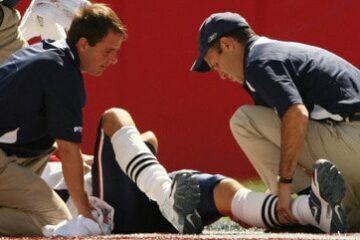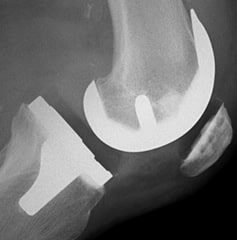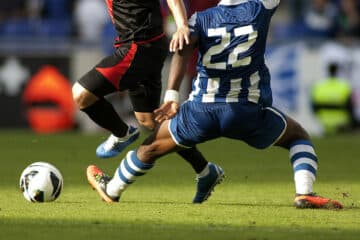
A knee replacement infection is an awful problem to deal with.
An infection of a knee replacement is one of the worst complications we worry about. That’s because it is very difficult to treat a knee after it is infected. Multiple surgical procedures and long term antibiotics are needed to attempt to rid your body of an infection once your knee replacement is infected.
Because an infection is difficult to manage, it is very important to focus on preventing a knee replacement infection in the first place.
Prevention is worth it’s weight in gold.
Preventing knee replacement infections can be broken down in 3 broad stages:
- Preventing infection BEFORE your knee replacement surgery
- Preventing infection DURING the surgery
- Preventing infection AFTER your surgery
Preventing an infection Before Your Knee Replacement:
- Dental evaluation: Your mouth can be a source of bacteria which can get into your blood and go to your knee. Make sure you have no cavities or decay that needs attention before your surgery.
- Showering with Chlorhexidine: Bacteria can live deep within our hair shafts. Showering for 5 days with an antibacterial soap can decrease the number of bacteria significantly. But check for allergies first… and do NOT use the soap longer than 5 days or after surgery.
- Anti-septic Mouthwash : Gargling twice a day for a few days before your knee replacement will decrease the bacteria number in your mouth.
- MRSA : If you have a history of a MRSA infection your should be screened for colonization. Tell your doctor and they can screen you and treat you before surgery.
- if you have been recently hospitalized your skin might be colonized with resistant bacteria. Best to wait a few months before surgery.
- Shaving: If you do not regularly shave your leg, then do NOT shave your leg in preparation for the surgery. Those little skin irritations will increase the risk of surgery dramatically.
- Skin abrasions: If there are any skin abrasions or lesions on your knee cancel your surgery and wait to they heal. Trust me!
Preventing and infection During Knee Replacement Surgery:
These are steps that your surgical team should employ to decrease the risk of a knee replacement infection.
- Make sure your surgeon performs many knee replacements per week. Experienced surgeons are more efficient. The longer your skin is open, the higher the risk of a knee getting infected.
- Antibiotics administered within 30 min of your skin being cut.
- Clean the skin with alcohol, betadine or chlorhexidine and chloraprep.
- Cover the limb is antibiotic sticky drape. This is a special plastic drape that sticks to your skin and keeps your bacteria from growing during the procedure.
- Soak the completed knee replacement in a dilute betadine solution before closing the skin.
- Minimize traffic in the operating room. Air movement moves stirs up bacteria.
Preventing a Knee Replacement infection After Surgery:
- Complete antibiotics within 24 hours of onset. Longer courses of antibiotics do NOT prevent an infection and lead to superbugs being formed.
- Early prompt attention/intervention for Tooth abscess. Don’t wait if your teeth hurt.
- Early prompt intervention for any infection anywhere on your body. – Infections can spread via the blood. See your doctor soon, even for ingrown toenails.
Infections following a knee replacement are not common, but they are a nightmare for you and your surgical team if they do occur. Common sense and a few extra key steps can go a long way to minimizing the chance of developing an infected knee after surgery.
Do you have questions regarding an Orthopedic injury or longevity?
Do you want to talk to an expert who can listen to you for 45-60 minutes and explain the options in detail?
Dr. Howard Luks offers remote guidance sessions to review your X-ray or MRI images and explain your options.
Dr. Luks has also received hundreds of requests for educational sessions on the topics discussed in his book, Longevity Simplified.













Lesley Knight
Had my total knee replacement 4 weeks ago. Wound is clean and healed nicely. Knee is still badly swollen and is hot to touch and still looks red.Bending it is very very painful also.
I have pain just up from my inner ankle and it is very painful to touch and still bruised.
The pain in my knee is now becoming unbearable and my pain relief doesn’t seem to work.
What do?
You need to speak with your surgeon. They may be able to offer you alternatives to assist you in getting the swelling down and ways to better manage your pain.
Kathy
I had two partial knee replacements last year. The left leg got infected. Went through the process of getting rid of the infection and total knee replacement. Three and a half months later we see infection again. Right leg is good. Why do I keep getting infection in the left leg?
Once you have an infection in can be very hard to eradicate. I suggest finding a revision surgeon who dealing with infected knee all the time. They are not easy to find, but can be worth the effort.
James
The patients even can enroll for the advanced recovery programs. It helps them to recover fast and protect themselves from infections
Mark Graban
How does a patient best ask the surgeon or the hospital about the practices that the hospital has control over?
HI Mark …
That’s a great question…
We know that many patients are nervous about asking questions. From my own experience, many patients seem to be more willing. Perhaps it depends on how the patient perceives the physician’s willingness to entertain those questions.
It’s important to understand that many hospitals may not have a routine joint replacement infection prevention protocol in place. This discussion should take place with the surgeon before your surgery is scheduled. This is your knee… and people should not be afraid to ask what we do to minimize the risk of infection.
Hopefully most physicians are receptive to the questions and will take the time to discuss it. Otherwise… the patient has the ability to find someone else who is equally as capable from a surgical perspective, but more receptive to entertaining the concerns of patient who wants to know more.